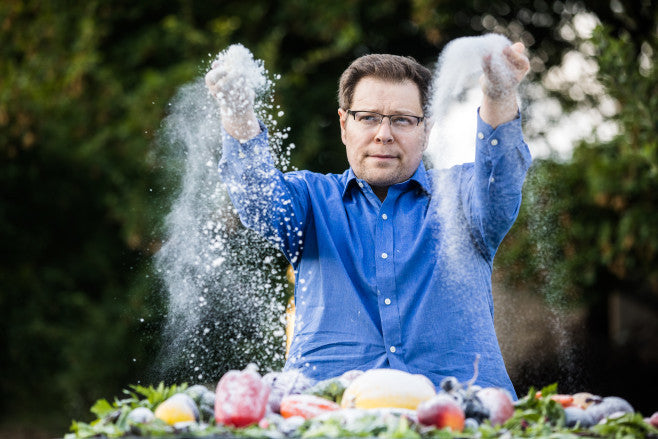
Mathematician Irakli Loladze tosses sugar over vegetables outside his home in Lincoln Nebraska, to illustrate how the sugar content of the plants we eat is increasing as a result of rising carbon dioxide levels. Loladze was the first scientist to publish research connecting rising CO2 and changes in plant quality to human nutrition. | Geoff Johnson for POLITICO
While it shouldn't come as a surprise that most of our food contains a lot more sugar and many fewer nutrients than we expect, it was astonishing to read Politico's report about the "Great Nutrient Collapse". Mathematician Irakli Loladze's report reveals that with the increase in carbon dioxide in the atmosphere, we are essentially creating "junk plants" that are rich in sugars but low in the essential nutrients we need.
Increased Carbon Dioxide levels - we know this from indoor growing, where we artificially enhance the CO2 in the air to make plants grow faster - fuel the photosynthesis in plants, much like sugary foods and drinks give us a short kick of energy. However, if we would only rely on sugar as our source of energy, we would quickly lack the micro-nutrients necessary for our metabolism. Similarly, when plants use CO2 doping to grow fast, they don't have the time to take up the nutrients they should. And with rising CO2 levels in the atmosphere, all we get is watery vegetables that are low in nutrients.
Loladze was the first scientist to publish a report on how carbon affects plant nutrients. And with plants providing fewer nutrients such as protein, iron and calcium than ever before, eating algae offers an even more important solution to global food supply.
I definitely recommend reading the full article here.



 Soybeans growing in a field outside Lincoln, Nebraska, one of many crops whose nutrient content is shifting as a result of rising carbon dioxide levels. | Geoff Johnson for POLITICO
Soybeans growing in a field outside Lincoln, Nebraska, one of many crops whose nutrient content is shifting as a result of rising carbon dioxide levels. | Geoff Johnson for POLITICO